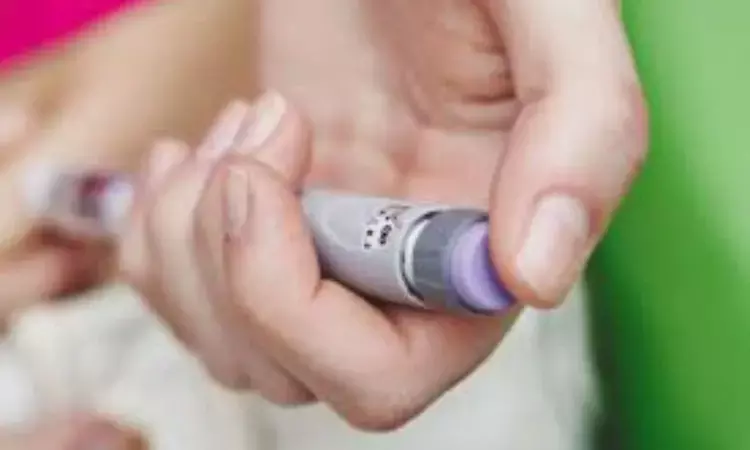- Home
- Medical news & Guidelines
- Anesthesiology
- Cardiology and CTVS
- Critical Care
- Dentistry
- Dermatology
- Diabetes and Endocrinology
- ENT
- Gastroenterology
- Medicine
- Nephrology
- Neurology
- Obstretics-Gynaecology
- Oncology
- Ophthalmology
- Orthopaedics
- Pediatrics-Neonatology
- Psychiatry
- Pulmonology
- Radiology
- Surgery
- Urology
- Laboratory Medicine
- Diet
- Nursing
- Paramedical
- Physiotherapy
- Health news
- Fact Check
- Bone Health Fact Check
- Brain Health Fact Check
- Cancer Related Fact Check
- Child Care Fact Check
- Dental and oral health fact check
- Diabetes and metabolic health fact check
- Diet and Nutrition Fact Check
- Eye and ENT Care Fact Check
- Fitness fact check
- Gut health fact check
- Heart health fact check
- Kidney health fact check
- Medical education fact check
- Men's health fact check
- Respiratory fact check
- Skin and hair care fact check
- Vaccine and Immunization fact check
- Women's health fact check
- AYUSH
- State News
- Andaman and Nicobar Islands
- Andhra Pradesh
- Arunachal Pradesh
- Assam
- Bihar
- Chandigarh
- Chattisgarh
- Dadra and Nagar Haveli
- Daman and Diu
- Delhi
- Goa
- Gujarat
- Haryana
- Himachal Pradesh
- Jammu & Kashmir
- Jharkhand
- Karnataka
- Kerala
- Ladakh
- Lakshadweep
- Madhya Pradesh
- Maharashtra
- Manipur
- Meghalaya
- Mizoram
- Nagaland
- Odisha
- Puducherry
- Punjab
- Rajasthan
- Sikkim
- Tamil Nadu
- Telangana
- Tripura
- Uttar Pradesh
- Uttrakhand
- West Bengal
- Medical Education
- Industry
Higher ambient temperature tied to increased hypoglycemia risk in older insulin users

USA: A recent study published in Diabetes Care has revealed an increased hypoglycemia risk in extreme heat among older adults (aged >= 65 years) with diabetes who received insulin.
"Higher ambient temperature was associated with increased risk of serious hypoglycemic events in two national samples of older insulin users," the researchers reported.
The thermoregulatory response is often compromised in older adults with diabetes, making them vulnerable to extreme heat. Soko Setoguchi, Department of Medicine, Rutgers Robert Wood Johnson Medical School, New Brunswick, NJ, and colleagues aimed to measure the association between ambient heat and hypoglycemia-related emergency department visits or hospitalization in insulin users.
For this purpose, the researchers evaluated the association between ambient heat and hypoglycemia in about 2 million and 283,000 patients (aged 65-100 years) with diabetes from the United States and Taiwan, respectively, who received insulin.
A serious hypoglycemic event was defined as a primary visit to the emergency department (ED) or an unplanned inpatient admission for hypoglycemia from June 1 to September 30. Medication use was determined by at least one prescription dispensing insulin within 90 days of the index event.
Cases of serious hypoglycemia were identified among adults using insulin aged ≥65 in Taiwan (via the National Health Insurance Database) and the US (via Medicare Part A/B/D-eligible beneficiaries) from 2016 to 2019. The odds of hypoglycemia were estimated by heat index (HI) percentile categories using conditional logistic regression with a time-stratified case-crossover design.
The study led to the following findings:
- Among insulin users overall, 32,461 and 10,162 older adults from the United States and Taiwan, respectively, experienced a hypoglycemic event.
- The risk for a serious hypoglycemic event was about 40% higher among insulin users on days with an HI ≥ 99th percentile than 25-74th percentile (unadjusted odds ratio, 1.38)
- On days with a low HI (< 25th percentile), the risk for hypoglycemia among insulin users decreased.
- No substantial differences were observed in the risk for hypoglycemic events and HI by climate region in either country, such as between the US Northeast and Southwest.
"Our finding of increased risk of hypoglycemia-related ED visits in older adults using insulin and exposed to extreme heat emphasizes the need for patients and providers to be aware and cautious that extreme heat may raise the risk of hypoglycemia," the authors wrote.
The study limitations include individuals with hypoglycemia who were older and had more comorbidities, so the authors suggest using caution before the results can be generalized to broader populations. The authors were also unable to capture variables that can modify the risk for serious hypoglycemia, such as exercise, outdoor activity and diet.
Reference:
Aayush Visaria, Shu-Ping Huang, Chien-Chou Su, David Robinson, John Read, Chuan-Yao Lin, Rachel Nethery, Kevin Josey, Poonam Gandhi, Benjamin Bates, Melanie Rua, Ashwagosha Parthasarathi, Arnab K. Ghosh, Yea-Huei Kao Yang, Soko Setoguchi; Ambient Heat and Risk of Serious Hypoglycemia in Older Adults With Diabetes Using Insulin in the U.S. and Taiwan: A Cross-National Case-Crossover Study. Diabetes Care 2023; dc231189. https://doi.org/10.2337/dc23-1189
Dr Kamal Kant Kohli-MBBS, DTCD- a chest specialist with more than 30 years of practice and a flair for writing clinical articles, Dr Kamal Kant Kohli joined Medical Dialogues as a Chief Editor of Medical News. Besides writing articles, as an editor, he proofreads and verifies all the medical content published on Medical Dialogues including those coming from journals, studies,medical conferences,guidelines etc. Email: drkohli@medicaldialogues.in. Contact no. 011-43720751


